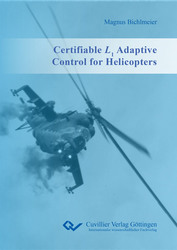| Fachbereiche | |
|---|---|
| Buchreihen (97) |
1381
|
| Nachhaltigkeit |
3
|
| Gesundheitswesen |
1
|
| Geisteswissenschaften |
2369
|
| Naturwissenschaften |
5408
|
| Ingenieurwissenschaften |
1795
|
| Allgemeine Ingenieurwissenschaften | 292 |
| Maschinenbau und Verfahrenstechnik | 862 |
| Elektrotechnik | 688 |
| Bergbau- und Hüttenwesen | 30 |
| Architektur und Bauwesen | 75 |
| Allgemein |
98
|
|
Leitlinien Unfallchirurgie
5. Auflage bestellen |
|
Erweiterte Suche
Certifiable L1 Adaptive Control for Helicopters
Magnus Bichlmeier (Autor)Vorschau
Inhaltsverzeichnis, PDF (52 KB)
Leseprobe, PDF (190 KB)
In Hubschraubern kommen mitunter aufwändige regelungstechnische Verfahren zum Einsatz, um ein intuitiv steuerbares und stabiles Verhalten der Maschine zu erzeugen. Klassische Ansätze in der Entwicklung setzen dabei auf Iterationen aus Systemidentifikation und Auslegung des Systems im Frequenzbereich. In diesem Buch wird vor dem Hintergrund der nur zu gerne unterschätzten Problematik der begrenzten Bandbreiten eine robuste adaptive Regelung eingeführt. Dazu wird ein hochfrequent-aktualisierender L1-adaptiver Regler entsprechend angepasst, ein neues adaptives Gesetz der Ausgangsrückführung eingeführt, eine neue Strategie zur Auslegung der Zustandsrückführung vorgestellt, und für den sicherheitskritischen Aspekt Effekte von Ungenauigkeiten im Rechentakt und von Sensorrauschen evaluiert. Während klassische Ansätze durch nichtlineare Optimierung weitestgehend automatisierbar sind und dennoch die Notwendigkeit wiederholter Flugtests nicht verhindern können, ist der L1-adaptive Regler bei entsprechendem Systemverständnis besonders geeignet, Entwicklungszeiten zu verkürzen. Strenge mathematische Beweise untermauern die Stabilität und Robustheit der eingeführten Algorithmen, wobei die Flugeigenschaften in einem Forschungssimulator verifiziert werden.
Often, very complex controller techniques are applied to helicopters for generating an intuitively controllable and stable behavior of the aircraft. In legacy controllers, a number of iterations of system identification and loop shaping methods in frequency domain have to be conducted. In this book, a robust adaptive control theory is introduced, with the often underestimated fact of only limited available bandwidths in mind. To this end, the high-frequency adapting L1-adaptive controller is adjusted, a new adaptive law for output feedback is introduced, a new strategy for defining the design of a state feedback controller is proposed, and effects of uncertainties in the processor clock rate and of sensor noise are evaluated for taking the safety critical nature of the system into account. While legacy approaches can be automated by nonlinear optimization techniques and yet cannot eliminate the necessity of repeated flight tests, the L1-adaptive controller is particularly suitable to reduce development time, provided a sufficiently deep understanding of the system is available. Rigorous mathematical proofs substantiate the stability and robustness of the algorithms as shown, while performance and handling qualities are verified in a research simulator.
| ISBN-13 (Printausgabe) | 9783736992818 |
| ISBN-13 (E-Book) | 9783736982819 |
| Buchendformat | A5 |
| Sprache | Englisch |
| Seitenanzahl | 248 |
| Umschlagkaschierung | matt |
| Auflage | 1. Aufl. |
| Erscheinungsort | Göttingen |
| Promotionsort | TU München |
| Erscheinungsdatum | 27.06.2016 |
| Allgemeine Einordnung | Dissertation |
| Fachbereiche |
Allgemeine Ingenieurwissenschaften
Mess- und Regelungstechnik Maschinenbau und Verfahrenstechnik Luft- und Raumfahrttechnik |
| Schlagwörter | Adaptive Control, L1-Adaptive Control, Helicopter, Flight System Dynamics, Helicopter Flight Dynamics, Certification Adaptive Regelung, L1-adaptive Regelung, Hubschrauber, Flugdynamik, Hubschrauber-Flugmechanik, Zulassung |
Rezension
Aerospace systems are among the most demanding applications for adaptive control. Especially helicopters are well known for a myriad of unique and varying effects, making it challenging to control with pure a priori knowledge. The book provides an insightful combination of physical understanding and mathematical research in the L1-adaptive control theory. We see in this book how L1-adaptive control supports a strong adherence to safety principles – moreover, pilots may like its predictable performance. (Prof. Naira Hovakimyan)








